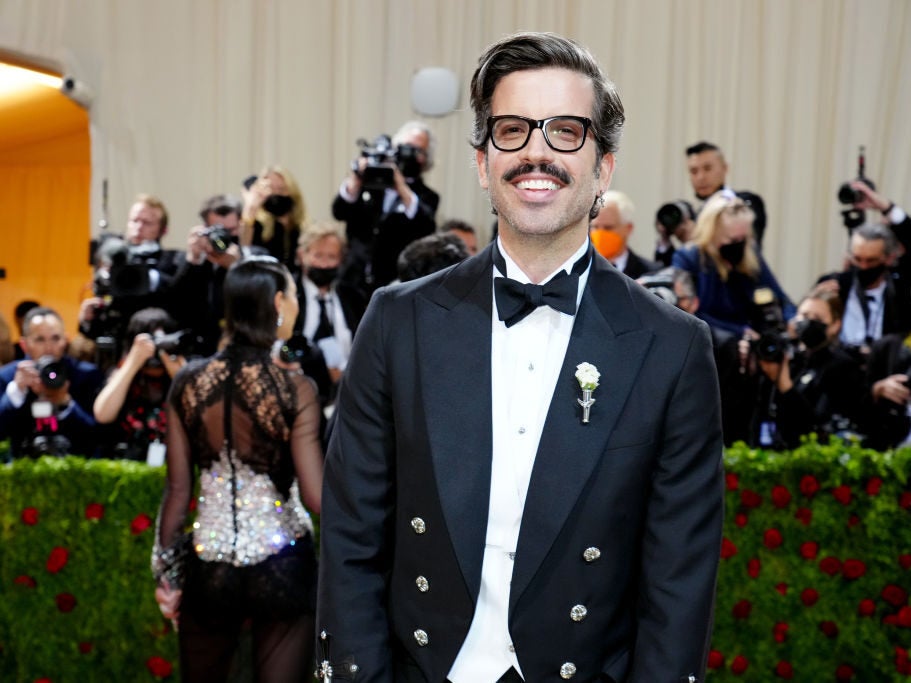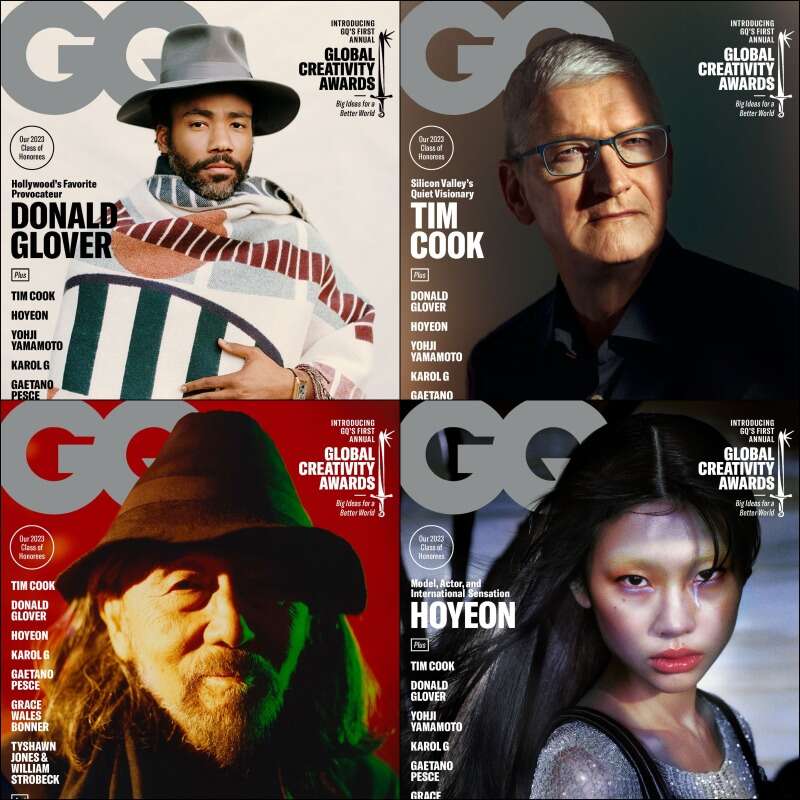
The global content strategy introduced at GQ in 2021 has taken hold of the idea that “every story is local, but it can resonate globally”.
GQ’s global editorial director Will Welch told Press Gazette’s Future of Media Explained podcast how the new collaboration between the male style brand’s teams in 20 markets worldwide has evolved to lead to the April creativity issue.
The issue marks the first time in which every edition of GQ has published the same magazine cover to cover.
It is accompanied by the inaugural Global Creativity Awards, a black tie gala being held in New York on Thursday (6 April), which celebrates nine winners, four of whom feature on the magazine cover, deemed to be “true multidisciplinary, multi-platform, highly collaborative creators”. The four cover stars are: Apple chief executive Tim Cook, actor and musician Donald Glover, fashion designer Yohji Yamamoto and Korean model and actress Hoyeon.
Welch said of that project that he hoped it would eventually grow to be as big as GQ’s flagship Men of the Year content and event brand.
He said the choices of the Global Creativity winners were significant because “we needed the totality of the list to truly be global. I think a lot of times in our world, brands will announce things like this but it kind of becomes just the ‘SOS’ – the same old stuff repackaged. And we wanted to make sure that we were really honouring this concept.
“If we’re going to call it the Global Creativity Awards, it’s going to be truly global and we’re really going to focus on this specific type of creator that we think is really driving culture.”

The journey to this point began within the first year of the Covid-19 pandemic when Conde Nast realised the tools people were using to work at home, such as the growth in Zoom meetings, meant its teams could collaborate globally in a way they never had before. Previously its editorial teams across one brand frequently worked in silos and ended up competing for talent and stories.
Welch said every GQ around the world now works as one team, both in editorial and on the business side, but the “most important foundation” was ensuring a “shared vision” around what GQ stands for and who its audience is.
The publisher made the changes at GQ, Vogue, Conde Nast Traveller, Wired and Architectural Digest. At GQ that meant the appointment of a global leadership committee, with some existing editors leaving – including long-time British GQ editor Dylan Jones – and the appointment of others into bigger roles.
Welch, who has worked at GQ since 2007, took on the global editorial director job alongside his existing role as editor-in-chief at GQ in the US, while GQ Middle East editor-in-chief Adam Baidawi became his deputy based in London.
The leadership committee talks about big new ideas like the Global Creativity Awards, shares editorial best practice and discusses what stories to syndicate between them that have been a hit with certain audiences – a conversation that could begin with an editor highlighting a piece or by them looking at their shared audience data dashboards.
Before the changes, Welch said, each edition of GQ – some wholly owned and others licensed out – was “marching to the beat of their own drummer”.
“I think there was an era where that was really valid and made sense, but the world has changed a lot, God knows the media business has changed enormously, and we felt like it was time to update our strategy and to really take hold of what I saw as a sort of latent superpower that we weren’t tapping into, that we weren’t using, that we weren’t organised to seize and apply,” he said.
“So what we did in 2021 was we underwent a global transformation and what we built was a true GQ global network.”
Welch added: “The other thing that’s really important to understand as a global media brand is that every story is local. There’s no such thing as a global story – the world itself does not birth an interesting story, whether it’s a celebrity that we’re covering or an incredible long-form yarn that we’re reporting out. All of it happens someplace super specific.
“So every story is local and through this global leadership committee, we’re able to raise ideas that come from all around the world, analyse them and also talk about big projects that we’re going to embark on together. So what does it mean for this longstanding tentpole programme of GQ’s Men of the Year? What does it look like in the global era?”
Last year was the first in which Men of the Year was brought into global alignment, with all 20 editions around the world releasing issues tying in and with local events in several major markets.
Welch said: “These big moments where you’re bringing the full firepower of the GQ brand to bear just are so important for the health of the brand, for awareness, for audience reasons, for commercial reasons.”
It means collaboration worldwide at Conde Nast has come a long way since 2018 when the US-based Conde Nast and Conde Nast International companies first officially merged.
In addition, rather than a men’s style magazine, as it might once have been described, Welch said GQ is now a “cutting edge global media brand” that thinks of itself as the “global flagship of men’s fashion”. It is for anyone who relates to or is interested in its points of view on fashion, lifestyle and culture.
Although fashion was the starting point of the brand, both in its original guise as Apparel Arts in 1931 and then Gentlemen’s Quarterly in 1957, it has always been about “embracing change. “It’s about the cutting edge, it’s about seeing around corners,” Welch said.
“We’re not a classicist brand that reasserts time-honoured values – we’re really looking ahead and we’re for readers who love to see what’s coming.”
This fits with the mantra it has espoused through its global transformation that “change is good”, Welch said.
In its original print magazine form, British GQ, reported an average monthly circulation of 85,080 in 2022 – down 29% in ten years – but it has fared better than many of the more downmarket men’s market magazines and others in the market such as Men’s Health which fell by 64% in ten years to 73,315 last year. Two popular free men’s magazines, Shortlist and The Jackal, closed in 2018 and 2019 respectively.
In the US, GQ had a print circulation of 944,892 in the second half of 2021, holding steady from the first half of that year.
But Conde Nast says the global transformation has particularly accelerated GQ’s online growth.
Without sharing exact numbers, it said GQ’s global traffic was up 54% in 2022 compared to pre-pandemic 2019 while its monthly average returning visitors were up 57% in the same timeframe.
Video views were up 13% year-on-year in 2022, with social video views up 177% and growth in its overall social following of 174%.
Pointing to the specific impact of the global strategy, Conde Nast said the number of GQ stories syndicated between editions on average per month was up 27% year-on-year in 2022, with unique visitors from these stories up 7%.
Commercially, Welch said the new strategy was “clearly resonating” with clients. He said the proposition had proved “really powerful just because there’s not another media brand with a men’s focus or with a men’s fashion focus that is organised in this way and that has this level of global presence. So I think we’ve really been able to separate ourselves from the competition…”
But it was necessary to “stay open-minded and flexible and see what worked and what didn’t” as longstanding clients needed to be brought along, and even if GQ’s plans were global many advertising budgets are still local.
“There’s this understanding from the clients that they are able to use us in this powerful, new, global way, but that isn’t necessarily how they’re organised,” Welch said. “But we’re still obviously organised that the budget can be spent locally, but there’s still opportunity to be unlocked on that front, which is exciting because I just see it as growth ahead.
“Collaboration obviously doesn’t just happen internally at a company. It also happens externally with your partners.”
Email pged@pressgazette.co.uk to point out mistakes, provide story tips or send in a letter for publication on our "Letters Page" blog
